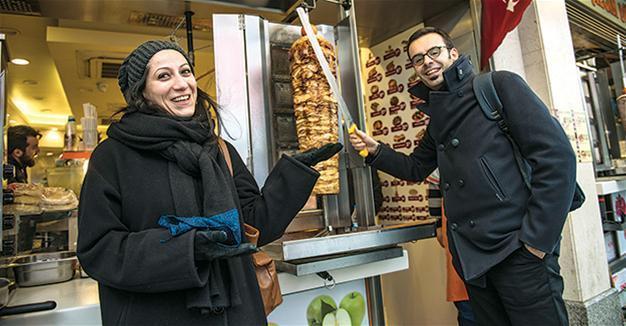French academic tells how Turkish döner kebap evolved into world food
Banu Tuna – ISTANBUL
 Turkey’s authentic döner kebap has evolved from being cheap fast-food, mostly preferred by Europe’s migrant communities, into a “food concept” that has dominated the world in an upward trend, French food geographer Pierre Raffard has said.
Turkey’s authentic döner kebap has evolved from being cheap fast-food, mostly preferred by Europe’s migrant communities, into a “food concept” that has dominated the world in an upward trend, French food geographer Pierre Raffard has said. Raffard delivered a speech on the globalization of the döner kebap at the Istanbul-based History Foundation on Jan. 26, where he explained the historical foundations of the food and described how it made it to the menus of world-renowned chefs. Raffard, a native of Paris, has expertise in cuisine-geography relations and holds a thesis on Gaziantep cuisine and is currently teaching gastronomy at İzmir Economy University.
“I am a Parisian. During 1990’s, my mom would never take us to döner shops. It was believed that döner shops were selling rat meat or horse meat. Only migrant workers used to go [to döner shops]. It was cheap and selling halal food and you could get full only by eating döner. Döner was mostly the food of migrants. Then poor local consumers discovered it. I mean European workers and students. Thanks to students, their families also began eating döner. It is an upward trend. Today Michelin Chef Thierry Marx serves döner in his restaurant. Important chefs who are interested in street food have advanced the class level of döner,” he said.
He said the döner kebap became popular in European and global cuisine scenes because it was simple and did not require expert chefs to make it.
“There were no chefs among the migrants who came from Turkey to Europe as guest workers. They were mostly workers who came to work at factories and constructions. When the 1973 OPEC oil crisis erupted, factories began to shut down and some of these workers became unemployed. With their capital earned, they decided to enter the food sector and most of them opened döner shops. Because it was very easy. It did not require chef skills or big investments,” said Raffard, adding that it became popular also because its cooking process was visible to many, which is why it drew interest from Europeans who were not used to such a concept.
He said that because it did not require advanced cooking education, it was the only traditional food that made its way to the world scene.
Raffard also called döner a “food concept” not a “food,” arguing that it is adaptable to different tastes and has no single recipe.
Speaking about the contentious issue of rivalry between the Turkish döner kebab and the Greek gyro, Raffard said it is actually an Ottoman food, which Greeks migrated with it from Anatolia to Greece after the fall of the Ottoman Empire and the founding of the Turkish Republic. According to Raffard, its transfer to Europe actually dates back to the 1930s when Greeks opened the first gryo shop there. Touching upon the dual identities of common foods in Turkish and Greek culture, Raffard said cultural borders were harder to map out than political borders.
















